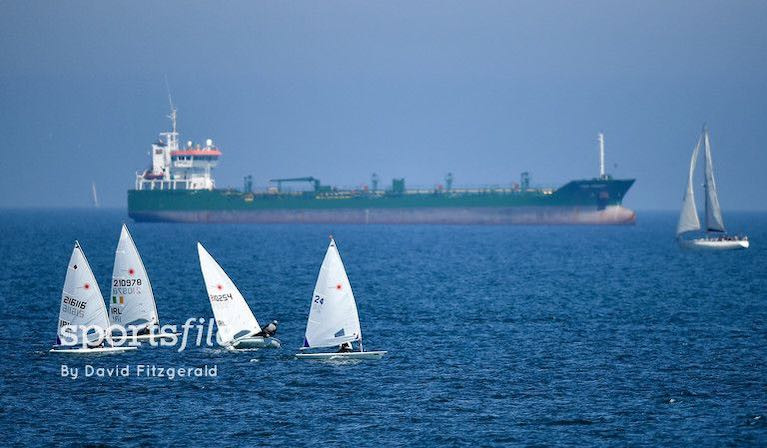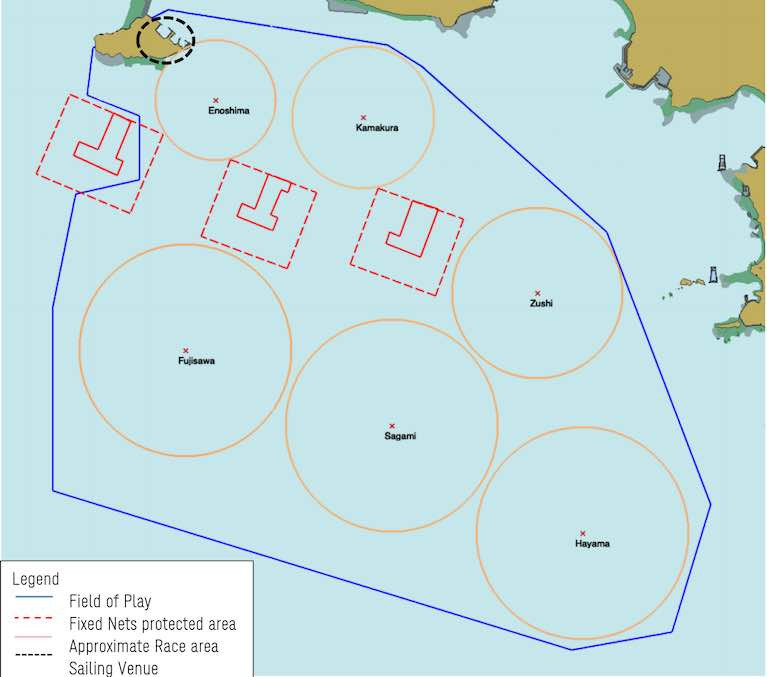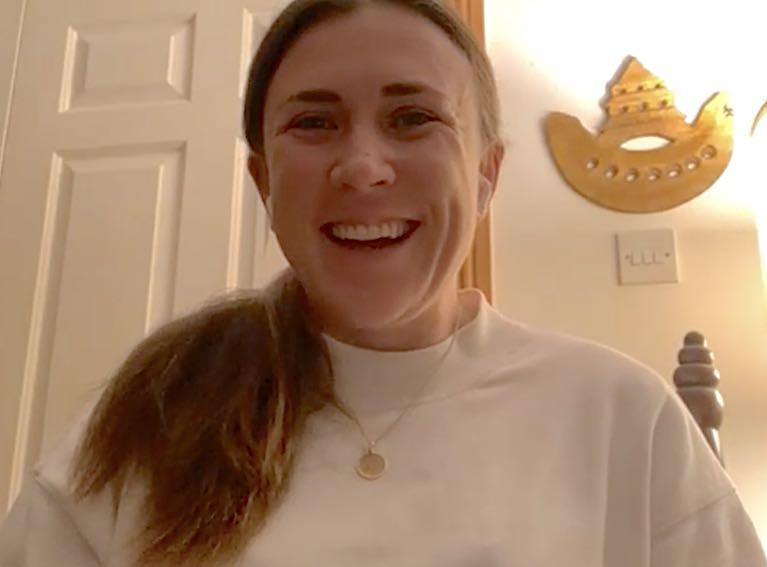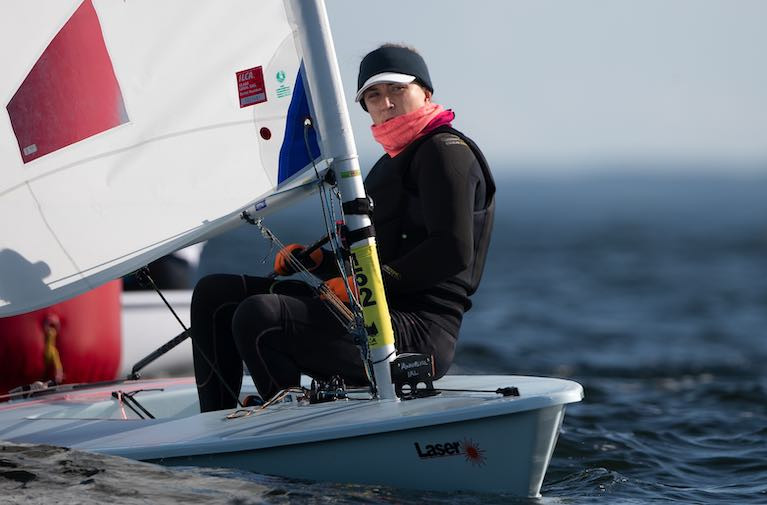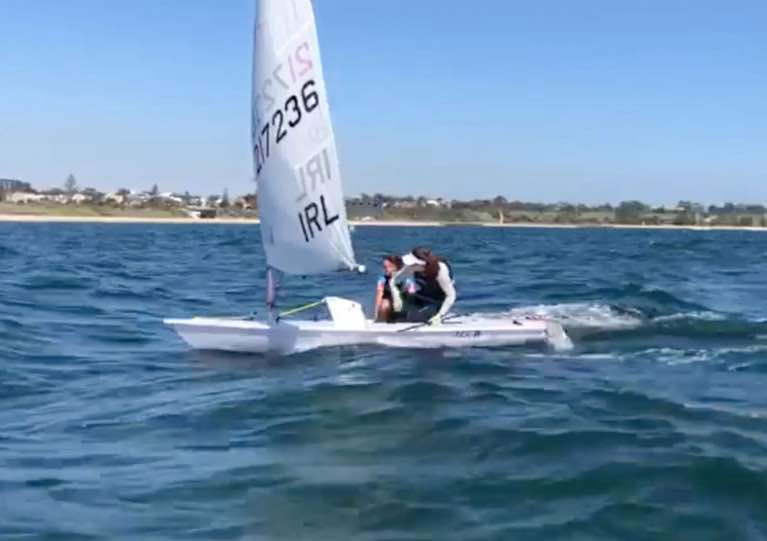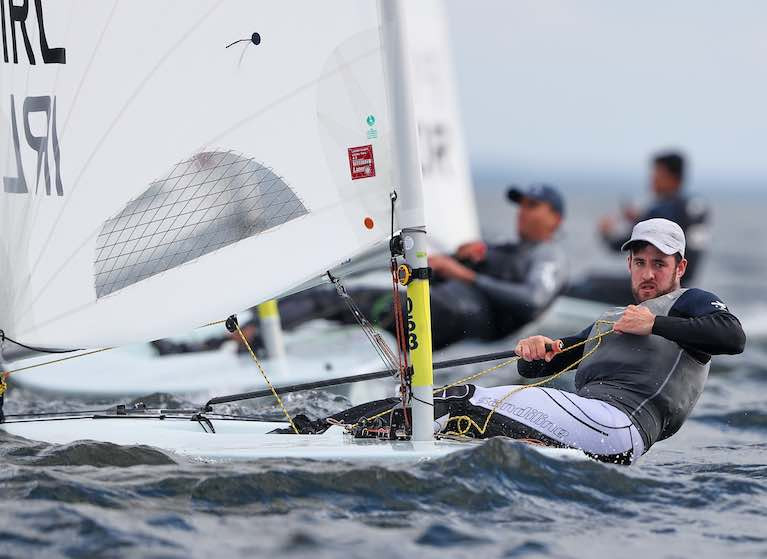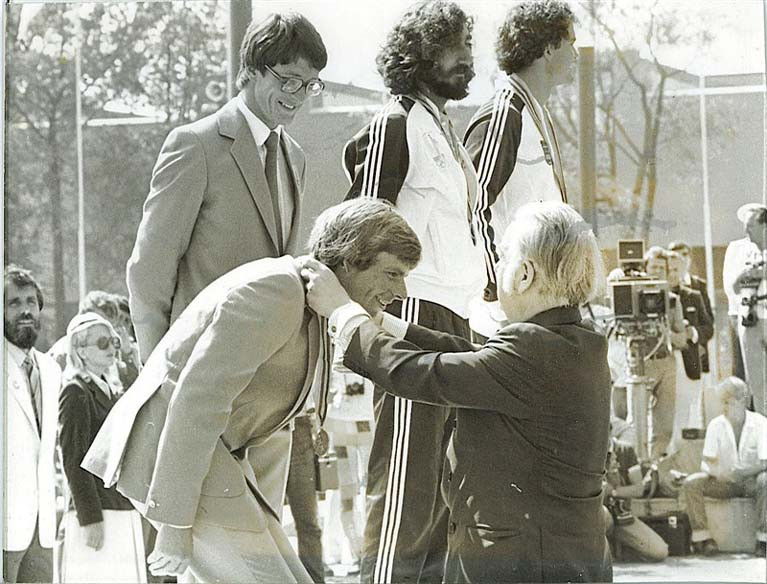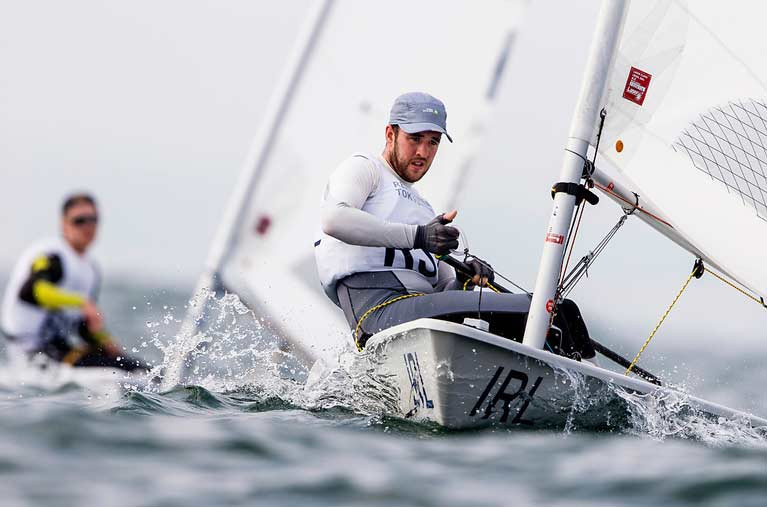Displaying items by tag: olympic sailing
Have We All Been Sharing a Bubble of Olympic Delusion?
Time was when the question of whether the 2020-Olympics-in-2021 should or should not be staged would have been described as the Elephant in the Room, suggesting the presence of an imponderable so large and unthinkable that the sanity-seeking majority of the global sporting population have continued determinedly along as though it is, of course, going to happen. The ponderous pachyderm, they've said, is a figment of people's imagination.
But a small but growing minority in sport are increasingly in agreement with the fact that an international super-spreader event like the Olympics simply has to be cancelled as the world still grapples with an ever-mutating virus.
That's the balance of attitudes within the gung-ho sporting community. But within the population at large, the situation is already very different, with 90% of the general population in host country Japan being against the idea of the Games going ahead in July – just two months and one week away, to be precise – while at the more specific level, at least 40 Japanese townships, which in previous Olympiad years had generously hosted national teams, have indicated that in July 2021, such teams will no longer be welcome.
 A Spreader Event of Olympic proportions…..but even if the traditional Olympic Parade is not staged in the event of the games being held in Tokyo in July, can safe distancing be maintained in a country where vaccination levels are still very low.
A Spreader Event of Olympic proportions…..but even if the traditional Olympic Parade is not staged in the event of the games being held in Tokyo in July, can safe distancing be maintained in a country where vaccination levels are still very low.
The emergence of this and other gloom-inducing facts during the past week or so, such as a lowly 1% vaccination rate in Japan itself, have contributed to what appears to be a tipping point in opinion in top sporting circles. This is leading to the weary resignation of preparing for acceptance of the unthinkable – that the postponed 2020 Olympics will not happen in 2021, and thus is there any point of thinking about a third attempt at staging them in Japan in 2022, when the 2024 Paris Olympics are already thundering up the agenda?
The scenario is so unthinkable - so unreal and rumour-prone - that those of us on the outside can only grasp at straws in the wind as to how things are going in the real decision-making centres. And for long enough, as the majority of us clung to the hope that the Games would go ahead - albeit in very shrunken relatively spectator-less settings – each little indicator that suggested things were on track was hopefully added to our viewpoint.
But in doing so, we were ignoring the sheer vastness, the extremely spread-out nature, and the very lengthy time-span of the modern Olympics. Even in the most normal of times, the potential for some section of the games to come off the rails is ever-present. So heaven alone knows what twists of disease and other trouble might unravel in the extreme heat of 2021 Tokyo in high summer, when hysteria can run amok.
 When Ireland first sailed in a Japanese Olympics in 1964, the racing was staged in October when the intense summer heat had eased. This year's regatta is planned here at Enoshima in July, a bit cooler than the main centre of Tokyo nearby, but still making a period of acclimatisation for Irish sailors highly desirable.
When Ireland first sailed in a Japanese Olympics in 1964, the racing was staged in October when the intense summer heat had eased. This year's regatta is planned here at Enoshima in July, a bit cooler than the main centre of Tokyo nearby, but still making a period of acclimatisation for Irish sailors highly desirable.
The two factors that seemed to put us through the tipping point this past week have been the Japanese townships' declining of the opportunity to host teams – for that was something very specific as opposed to the vagueness of a national opinion poll – and the outcome of an announcement last week, that this week would be seeing all national teams receiving their first jab of the Pfizer vaccine if they hadn't already got it, or were on some other vaccination.
The Pfizer seems to have emerged as the Gold Standard, as it provides 95% immunity whereas some of the "workhorse" vaxes, while still effective, give significantly less protection. But anecdotal evidence from personal experiences suggests that the two-part Pfizer super-jab leaves you in no doubt whatever that your body has been put through quite a major biochemical experience.
There's a four week gap between the two Pfizer injections, and a full return to feelings of normality shouldn't really be expected until about a fortnight after the second jab, though the latest research suggests that you'll have achieved virtually full immunity one week after Jab Two.
Full immunity and a feeling of general well-being are two very different psycho-physical states, and thus it's realistic to think that an Olympic athlete receiving the full Pfizer treatment would need to have a clear eight week period after the first jab, before they could hope to return to that very finely-tuned condition which is optimal performance preparedness, and has more physical and mental components than you'd think possible.
Thus when the announcement came last week that agreement had been reached for all un-vaccinated Olympians to begin the Pfizer course this week, with the response coming that Olympic medical teams were ready and able for the administration, it gave us small grounds for added optimism. For this proposed schedule was just within the time-frame for the full post-vaccination recovery of the athletes by the time the Games began to take shape.
 Team Dickson/Waddilove performing at peak. To achieve this level of fitness, an athlete would need to be as far post-vaccine as possible.
Team Dickson/Waddilove performing at peak. To achieve this level of fitness, an athlete would need to be as far post-vaccine as possible.
But so far this week we've not been able to confirm any evidence at all that the widely-welcomed vaccination programme for the Olympians has gone ahead, and that apparent non-event - in addition to the Japanese townships' "Not Welcome" announcements - suggest we're in a domino-effect continuum, at the end of which we'll find the cancellation of the 2021 Olympics.
That said, much of the athletic preparation towards the postponed Games has been done under the radar, and it could well be that it's official Olympic management policy not to reveal that a vaccination programme is under way at the moment until it is successfully completed, for fear of arousing some unpleasant protests from career begrudgers about the Olympians receiving elite treatment when the world is crying out for vaccination.
Most reasonable folk would strongly support the view that Olympic athletes – a very tiny minority – have done so much to inspire the rest of us, cheering us up generally through two winters of gloom, that they should as a matter of course have been among the primary groups for vaccination.
For sure, the real heroes deserving immediate vaccination have been the frontline health workers. But it's almost impossible to over-estimate the psychological benefits which those able to continue successfully with their sport have gifted to the rest of us. And while the unique nature of our sport has meant that quite a bit of in-Ireland sailing has been possible in pandemic gaps, it is the Irish sailing breakthroughs at a restricted international level that have been the brightest lights in the general gloom.
It was as recently as mid-March that the Afloat.ie Editorial Team were having a conversation with renowned coach Tytus Konarzewski about the chances of the "Fingal Flyers" 49er team – Rob Dickson of Howth and Sam Waddilove of Skerries - making it past the final stages of Olympic selection – the last chance saloon - at Lanzarote at the end of the month.
The hugely experienced Konarzewski has seen and done it all, and comfortably takes the long view. When he started coaching with Dickson & Waddilove, it was with the long count-down to the 2024 Olympics in mind. But didn't the boys go and spoil it all by winning the U23 49er Worlds at Marseille in September 2018?
This not only made them the Afloat.ie Sailors of the Year 2018, but also saw them yanked by the powers-that-be out of their buildup programme towards 2024, and pushed instead into the main road towards Tokyo 2020, while the highly-regarded Konarzewski was let go.
 The Sage of Successful Sailing – renowned coach Tytus Konarzewski in thoughtful observational mode on Dublin Bay. Photo: Afloat.ie/David O'Brien
The Sage of Successful Sailing – renowned coach Tytus Konarzewski in thoughtful observational mode on Dublin Bay. Photo: Afloat.ie/David O'Brien
It was an arguably unhealthy development in terms of campaign planning, but where others then came to see the postponement of the 2020 Olympics as a problem in the latter stages of securing the 49er slot in 2021, Dickson & Waddilove saw it as an opportunity to up their game, and as the final selection races came over the horizon, they were in a new place in terms of performance and potential.
Nevertheless, in that mid-March conversation with the great Tytus, there was still a huge element of the "what ifs" about the permutations which could make the breakthrough possible. And in the actual event when the pressure was palpable, the burden on the two young sailors was inescapable. Yet they managed it with the medal race to spare. And with the pressure off, their carefree performance of brilliance in the final race to leave so many top sailors behind them simply adds to our hopes that the 2021 Sailing Olympics at Enoshima will somehow take place.
 The Fingal Flyers qualify for the Olympics – Sam Waddilove of Skerries and Rob Dickson of Howth in Lanzarote, with Rob wearing his lucky hat which reminded everyone of………
The Fingal Flyers qualify for the Olympics – Sam Waddilove of Skerries and Rob Dickson of Howth in Lanzarote, with Rob wearing his lucky hat which reminded everyone of………
 …..the sailing headgear which was the trademark of his famous grandfather Roy Dickson, seen here at the helm of his Corby 40 Cracklin Rosie at the start of the 1997 Fastnet Race. Photo: W M Nixon
…..the sailing headgear which was the trademark of his famous grandfather Roy Dickson, seen here at the helm of his Corby 40 Cracklin Rosie at the start of the 1997 Fastnet Race. Photo: W M Nixon
Not least of the pleasures in their success in Lanzarote was that Rob Dickson took part in a post-race interview in his new "lucky hat", which fondly reminded all those who knew of it of the similar hat which was the trademark headgear of his legendary sailing grandfather, the late Roy Dickson.
This in turn reminds us that at its best, Irish sailing is just one great big family affair, even if it often involves putting an extremely broad meaning on what "family" signifies. But whatever it is, it's good. And while we hope very dearly indeed that our reading of the rules about the staging or not of the 2021 version of the 2020 Olympics proves to be wrong, should it be right we can only point to the next suitable date as being 24th July 2022.
Irish Olympic Sailing Team's Dublin Bay Photo Makes Sportsfile's Images of the Year Collection
Leading sports photo agency Sportsfile has included a photo of the Irish Olympic Sailing Team in its 'Sportsfile Images of the Year' portfolio.
The image by ace snapper Dave Fitzgerald captures Irish Laser sailors, from left, Eve McMahon, Liam Glynn, Finn Lynch and Annalise Murphy during a high-performance squad training session at Dun Laoghaire Harbour on Dublin Bay.
The image was taken in June when many sports were allowed to resume training and open training facilities from June 8 under the Irish Government’s Roadmap for Reopening of Society and Business following strict protocols of social distancing and hand sanitisation among other measures allowing it to return in a phased manner, having been suspended since March due to the Irish Government's efforts to contain the spread of the Coronavirus.
Olympic Sailing Regatta Tokyo 2021 Notice of Race Published
The Notice of Race of the Tokyo Olympic Games has been published by World Sailing, the sailing regatta will take place from July 25 to August 4.
Following the postponement of the Tokyo 2020 Olympic Games to 2021, World Sailing has released the Notice of Race for the Olympic Sailing Competition.
The competition will run out of Enoshima Yacht Harbour in Japan and will commence on 25 July with the concluding Medal Race on 4 August.
The Notice of Race states the key conditions for the 10 sailing events at the Tokyo 2020 Olympic Games.
The Men's 470, Women's 470, Laser, Laser Radial and Finn fleets will sail ten races as part of their opening series with a concluding Medal Race. Twelve races will be held for the 49er, 49erFX, Nacra 17, Men's RS:X and Women's RS:X fleets ahead of their Medal Races.
Included within the Notice of Race are details on the rules, regulations, entry and qualification guidelines, format, scoring, schedule, venue and courses.
Athletes, coaches, trainers and other team officials shall comply with the Olympic Charter, as well as with the World Sailing rules, in order to be eligible for participation in the Tokyo 2020 Olympic Sailing Competition, and shall be entered by a National Olympic Committee (NOC).
Download the full notice of race below as a PDF
Olympic Radial Sailor Annalise Murphy on Tokyo 2021 Training Plans
Annalise Murphy, (30), the only Irish sailor nominated so far for the 2021 Olympic Regatta, has spoken of the difficulties presented by COVID-19 in attempting to train at the Tokyo Regatta venue.
The fact that the Olympics is going ahead at all is positive news for the Irish star but after a year of continuous training at home, and little in the way of competition, it has been a frustrating scenario for the National Yacht Club sailor in her bid for Olympic gold next year.
She told a special presentation of the Irish Laser class at its recent AGM that she 'obviously would love to train in Tokyo before the Olympics but the reality is that it might be very difficult to do that'.
Firstly, Murphy says, there is the question about whether international athletes will be allowed into Japan at all during the current lockdown, then there is the level of quarantining required once in Tokyo. "If we have to spend two weeks quarantining in a hotel room in order to just do a two-week training camp then the reward may not really be worth the loss of all that time".
 Rio Silver medalist Annalise Murphy was crowned 2020 Italian Olympic Week champion in September, just one of a few international Radial regattas held in 2020
Rio Silver medalist Annalise Murphy was crowned 2020 Italian Olympic Week champion in September, just one of a few international Radial regattas held in 2020
As a result, the Rio silver medalist says, in reality, she 'doesn't really know what is going to happen'.
'We just have to be happy to take it one step at a time. If the opportunity presents itself to go out to Japan beforehand, that's brilliant but if not I can’t worry about it too much because no one else can go out there either'.
Her plan is to stay positive over the winter and 'roll with whatever happens', she concludes.
Olympic Federation Updates on Irish Sailors Looking to Qualify in 49er & Laser for Tokyo 2021
The Olympic Federation of Ireland (OFI) say in an update that Irish athletes across most sports are still on the qualification journey for the Tokyo Olympic Games which now take place next year from 23 July to 8 August 2021. Sailing is no different with only one of a possible three confirmed so far.
To date, there are 52 confirmed athlete spots for Tokyo, with many more athletes and teams sitting inside qualification status.
Eleven sports to date will enjoy Irish representation in Tokyo, and the current tracking of the team could see Team Ireland travelling next summer to Tokyo with the largest Olympic team to date.
In sailing, Ireland has already qualified one boat for Tokyo – the Women’s Laser Radial, which was achieved via Aisling Keller at the World Championships in 2019 – this position is set to be filled by Annalise Murphy, who has been nominated by Irish Sailing after a cut-short trial that left both Keller and Howth rival Aoife Hopkins 'devastated'.
'Selection', say the OFI, will be made once the process has been completed.
 Seafra Guilfoyle (left) and Ryan Seaton are one of two Irish 49er campaigns looking for the last nation berth for Tokyo 2021
Seafra Guilfoyle (left) and Ryan Seaton are one of two Irish 49er campaigns looking for the last nation berth for Tokyo 2021
There are still limited opportunities for Ireland to qualify another boat – the 49er can still qualify at the planned European Sailing Cup where one spot is available. As Afloat reported earlier, Ireland is vying with Belgium, Sweden and Italy for the one remaining European place. Form at the 2020 Worlds suggested that Irish sailors would be favourites having finished ahead of the other three candidates.
 Laser sailor Finn Lynch, one of three Irish helmsmen seeking a final nation berth for Tokyo 2021
Laser sailor Finn Lynch, one of three Irish helmsmen seeking a final nation berth for Tokyo 2021
In the Men’s Laser, there are two spots available at the planned European Sailing Cup. Up to six countries are in the running – Slovenia, Switzerland, Spain, Netherlands and Belgium and Ireland with Ireland finishing behind all of these at the latest World Championships.
In both of these events, the majority of spots were available at the World Championships in 2019 but unfortunately, Ireland missed out.
As Afloat reported in back in March the IOC, in their determination to maintain normality – or to return to normality as soon as possible – have issued a position update on the 2020 Tokyo Olympics and the potential changes to the qualification process disrupted by the spread of Covid-19.
Many sports, including sailing, have had to cancel qualifying events and the IOC has asked International Federations to consider revising the qualification process which may include ranking or historical results. More on this here.
The process of intense training, endlessly learning, and continually practising in the hope and expectation of improving your game does not come easily to many Irish sailors. The fact of our being an island nation, and having a very long history of sailing with a strong family tradition within it, gives us a vague but inescapable feeling that getting the best from a sailing boat comes naturally to us, as we reckon we're provided with this genetically inbuilt talent which only needs some occasional tweaking to keep us at the sharp end of the fleet.
Yet as Ireland's top international sailing performers have been learning – and telling us too – for very many decades now, it is only by being open-minded to learning and training and practising and competing again and again at the highest level abroad that you begin to come anywhere near the standard required.
Thus far from being at an advantage as maritime dwellers on an island of relatively low population, we actually face into the top international competitions at a treble disadvantage. Firstly, by having this inherited disposition of feeling that we know most of it already means that, instead of starting from scratch, we actually have to un-learn many of our bad sailing habits before we can begin to progress in the true path.
 Seekers of the true performance path……Annalise Murphy, Rob Dickson and Sean Waddilove at a fund-raiser for the Dickson-Waddilove 49er Campaign. Photo: W M Nixon
Seekers of the true performance path……Annalise Murphy, Rob Dickson and Sean Waddilove at a fund-raiser for the Dickson-Waddilove 49er Campaign. Photo: W M Nixon
Secondly, we've to get where the real competition is - which is nearer the main centres of population and definitely not on our little island - so logistics are almost always a real challenge. And thirdly, always in the background is the limitation of resources in a national economy which is already smaller than that of some major cities.
Oh sure, some figures seem to show that – were the times normal - we'd be awash with dough. We may indeed be awash with money. But much of it is already spoken for, as we're a nation of mortgage slaves on the inexplicably highest interest rate in Europe, and with many ridiculously expensive utility services to pay for as well. So always, in hoping to promote Irish sailing to the top international performance levels, the Irish sailing community's leading young contenders are up against the shortage of resources in addition to this underlying feeling that trying too hard is somehow un-Irish.
Graceful and seemingly effortless amateur success - done in an atmosphere of quiet modesty rather than noisy air-punching self-aggrandisement – is still a widely-shared Irish sailing ideal.
It was an attitude which was in retreat, but it now may well be holding its own, as the larger world increasingly questions whether or not the approach needed to achieve international sporting success at the top level is really a way of life which is conducive to producing well-balanced socially-positive individuals, rather than one-dimensional sports achievement monomaniacs with no hinterland of other normal interests.
 When it all becomes perfect – Rob Dickson and Sean Waddilove at one with their challenging 49er
When it all becomes perfect – Rob Dickson and Sean Waddilove at one with their challenging 49er
But there's another way of looking at this. The ancient Greeks, who have some skin in the game in the matter of the Olympic sports ideal, regarded sport and its highest possible achievement as being central to their culture. So those modern cultural gurus who dominate thinking in the arts of all kinds, while at the same looking down disdainfully on sport, are themselves as blinkered as the totally single-minded sportsperson who thinks only of his or her competitive life to the virtual exclusion of everything else.
And fortunately for the general good of society, for many able athletes, the period of total absorption in their sport at the highest level is within a defined period of peak achievement potential. The better national sports authorities are becoming more adept at easing their stars back into a fulfilling "civilian" life once their days at the sharp end of performance are drawing to a close.
Certainly, we can think of former stars who were somehow never subsequently comfortable in the outside world. But there are now far more stars of yesterday who have aged gracefully into useful and highly-respected members of their community as people with a wide range of interests.
 Engaging with another world. Finn Lynch and Annalise Murphy racing former Olympian Cathy Mac Aleavey's Water Wag in Dun Laoghaire when the 2020 sailing season finally got properly underway on July 15th. They won. Photo: Con Murphy
Engaging with another world. Finn Lynch and Annalise Murphy racing former Olympian Cathy Mac Aleavey's Water Wag in Dun Laoghaire when the 2020 sailing season finally got properly underway on July 15th. They won. Photo: Con Murphy
But instead of spouting vague sociological theories and examples, it is surely better to catch up with some of our most promising young sailing stars as they take stock of the situation now after a frustratingly limited international season. It may have started in some style on the other side of the planet in January and February with Worlds in Melbourne, Australia, but has since made uneven progress with a postponed and restricted Kiel Week in Germany in September, and most recently with majors at Attersee in Austria and the Laser Europeans in Gdansk in Poland.
Download the background details on Ireland's current Performance Squad below.
Not surprisingly, the extremely uneven nature of the year's programme produced uneven results for Ireland's sailors, such that it was reckoned good going to get into single figures in the final leaderboard, and 2016 Olympic Silver Medallist Annalise Murphy of the National YC nearly achieved that with 12th in the Women's Laser Radial Worlds in Melbourne on a scorecard which included a race win, while she'd the additional intriguing experience of taking fellow Olympic Silver Medallist Sonia O'Sullivan – who won her medal in the 5000 metres in the 2000 Games - for a sail in the Murphy boat.
That Laser gathering Down Under included the remarkable campaign by 15-year-old Eve McMahon from Howth, who'd come to added prominence in July 2019 with her win in the U17 Laser Radial Worlds in Canada, and now - six months later - was on a solo run in Australia as a taster and tester towards a challenge for 2024, with a Melbourne campaign so solo that she was in effect her own shore manager, accommodated with a family she'd never met before.
 Youthful determination. Although Eve McMahon won't be entitled to a full driving licence until March 2021, she has already successfully experienced International Laser racing at the top level.
Youthful determination. Although Eve McMahon won't be entitled to a full driving licence until March 2021, she has already successfully experienced International Laser racing at the top level.
If anything it increased her already considerable enthusiasm, but as she said this week, it was a vertical curve in learning what's involved at the stratospheric heights to which the Irish Sailing Academy is aiming.
"It's such a different world, totally remote from club sailing or even regional or national championships. If you respond to it, you find the atmosphere is electric, and I'm very keen to progress to make the most of it in every way. And yes, it will be a great help to qualify for a driving licence when I turn 17 in March 2021…..."
Sailing Performance HQ at Dun Laoghaire Harbour
This mixture of dealing with the mundane demands of logistics ashore while aspiring to athletic genius afloat is something which immediately separates the trainee stars from other sailors, so much so that they often find their most congenial company within their own circle of international campaigners. Thus the creation last year of the modestly-scaled Irish Sailing Performance HQ – usually known as the Olympic Sailing HQ - within the Irish Lights compound in Dun Laoghaire, utilising a €300,000 grant from the Irish Sailing Foundation, has provided a remarkable sense of cohesion and camaraderie among the top tier.
 Back to business. Finn Lynch and Annalise Murphy preparing their Lasers in the Irish Sailing Performance HQ in Dun Laoghaire. Photo: Rachel Fallon Langdon
Back to business. Finn Lynch and Annalise Murphy preparing their Lasers in the Irish Sailing Performance HQ in Dun Laoghaire. Photo: Rachel Fallon Langdon Boys-o-buoys…..Rob Dickson and Sean Waddilove sorting the knitting on their 49er in the Performance HQ beside the Irish Lights nav aids. Photo: Rachel Fallon Langdon
Boys-o-buoys…..Rob Dickson and Sean Waddilove sorting the knitting on their 49er in the Performance HQ beside the Irish Lights nav aids. Photo: Rachel Fallon Langdon
International 49er campaigners Rob Dickson and Sean Waddilove – from Howth and Skerries respectively – have to co-ordinate central aspects of their training with the other 49er challengers Ryan Seaton from Belfast Lough and Seafra Guilfoyle from Cork, and the Performance HQ provides the focus for this.
Between them, they have four home clubs, so whichever one was selected as a temporary base inevitably saw them differentiated as "the Olympic squad", their presence sometimes at variance with the much more easy-going mood which can prevail in club sailing. But with the Performance HQ, there's no doubt about what's going on, this is their own bubble, their own base, and they all understand and encourage each other's motivation in a mutual support group.
 Getting ready for lift-off with Cracklin' Rosie. The provision of a dedicated base at the performance HQ with its workshop facilities has proven a real benefit. Photo: Rachel Fallon Langdon
Getting ready for lift-off with Cracklin' Rosie. The provision of a dedicated base at the performance HQ with its workshop facilities has proven a real benefit. Photo: Rachel Fallon Langdon
Maybe so, but ultimately it's all about crews being on their own and completely for themselves in competition afloat, and in the Irish context the introduction of the International Laser as an Olympic class in 1996 in two categories has been a Godsend. While the 49er is the undoubtedly spectacular eye-catcher and a boat of character – Rob Dickson and Sean Waddilove have gone so far as to name their primary boat Cracklin' Rosie after Rob's late grandfather Roy's legendarily successful offshore racer – the 49er is an expensive bit of kit and needs a crew of two. But the sublimely simple solo-sailed Laser provides remarkable value for money at every level of competition.
So although there's still a chance that Ireland could secure a place in the 2021 Olympics for a 49er if enough selection events can be held as (hopefully) the pandemic recedes internationally, there's perhaps a better chance that Finn Lynch (who took a personal best of 13th, the same as his World Ranking, at the Euros) can pull it out of the hat for a place in the Laser men's, as outlined in Afloat back in March here. But already firmly in place with nomination officially made is Annalise Murphy. Yet even with the security of that assured place, she and her coach Rory Fitzpatrick have to get through a late Autumn and probably a winter of suspended animation.
Of course, there are all sorts of alternative training options, with the 49er teams into weights at home while everyone on the squad is an avid cyclist - so much so that at various stages in the past both Annalise Murphy and Finn Lynch have had their planned sailing programmes interrupted by cycling accidents.
 A very young Finn Lynch takes his first sail as an absolute beginner with a Topper at Blessington.
A very young Finn Lynch takes his first sail as an absolute beginner with a Topper at Blessington.
 A new world – Finn Lynch in control in the Laser
A new world – Finn Lynch in control in the Laser
But in the end, it's time afloat - with competition or co-training at the highest possible level available – which is essential, and the hope is that lockdowns may have lifted enough for Vilamoura in Portugal to become it usual inventive self early in the year with pop-up championships, while much hope is being pinned on the possibility of the Princess Sofia championship in Mallorca early in April.
Certainly, the recent big-fleet Laser Europeans in Gdansk impressed everyone with the social-distancing and other health standards which were rigorously maintained while proper racing was being provided afloat, but whether that can be done in the more easy-going mood of southern Europe is another matter.
Meanwhile, Ireland's potential sailing Olympians maintain their fitness and attitude as best they can, and allow other aspects of their lives to play a larger role for the next six weeks, with Aoife Hopkins at UCD concentrating on exam preparation, Eve McMahon at the pressure-cooker Institute of Education focusing on studies and test levels which are of Olympic standards in themselves, while Rob Dickson, having found that it was simply impossible to balance his sailing programme with the demands of personal attendance at DCU to further his studies in Sports Science and Health, has transferred to an online course at Manchester Metropolitan University.
Like everyone else, our Olympic sailing hopefuls have to get through this Winter of Frustration as best they can with the support of family and friends. But as with everything to do with the Olympics, it all seems to be accentuated, emphasised and multiplied many times over.
Read all the latest Irish Olympic Sailing News in the build-up to Tokyo 2021 here
Belfast Lough's Liam Glynn Leads Irish Laser Men After Day One of European Championships
In the first day of racing in the 2020 Laser Senior European Men's Championships & Open European Trophy in Poland, Belfast Lough's Liam Glynn is 29th and top Irish sailor in the 126-boat fleet.
After two races sailed in flat water and a shifty medium breeze blowing off the land, Ireland's 2016 Rio Olympic rep Finn Lynch is 37th. Howth's Ewan McMahon is lying (89th).
The reigning 2019 European champion Lorenzo Chiavarini GBR (1-1) has started the championship with a perfect score, leading the fleet with two points. Filip Jurisic CRO (1-4) is second with 5. Italians Marco Gallo ITA (6-2) and Nicolo Villa ITA (6-3) are third and fourth respectively.
The British squad positioned two other sailors among this early top 10, with Elliot Hanson GBR (3-8) on fifth and Michael Beckett GBR (4-15) on sixth (9th overall).
Seventh place (8th overall) for Russian Sergey Komissarov RUS (13-5).
Places 6th, 7th and 10th overall for non-European sailors Clemente Seguel CHI, Juan Maegli GUA and Ryan Lo SGP.
The reigning 2020 World champion Philipp Buhl GER (22-6) is 18th among 126 competitors.
Results here
With the world becoming unrecognisable as the invisible Enemy of the People takes over to make our lives Coronavirus-dominated and postpone the 2020 Olympics to 2021, in our not-so-splendid isolation we can find consolation in disappearing into the Afloat archives for items of interest, and preferably good news. For the one real consolation of history (which really only begins after at least 25 years have elapsed) is that at least we know how it all turned out, as the reality these days is that the worst thing about the current global pandemic (is there any other kind?) is its inherent uncertainty of outcome.
So when we look back to 1980 when David Wilkins of Malahide YC and Jamie Wilkinson of Howth YC won Ireland’s first-ever Olympic sailing medals – two Silvers – in the ferociously challenging Flying Dutchman class at the Moscow Olympics, it now has the glow of a golden era when all was well with the world. But as it happens, it was anything but a golden era, and the world was tense.
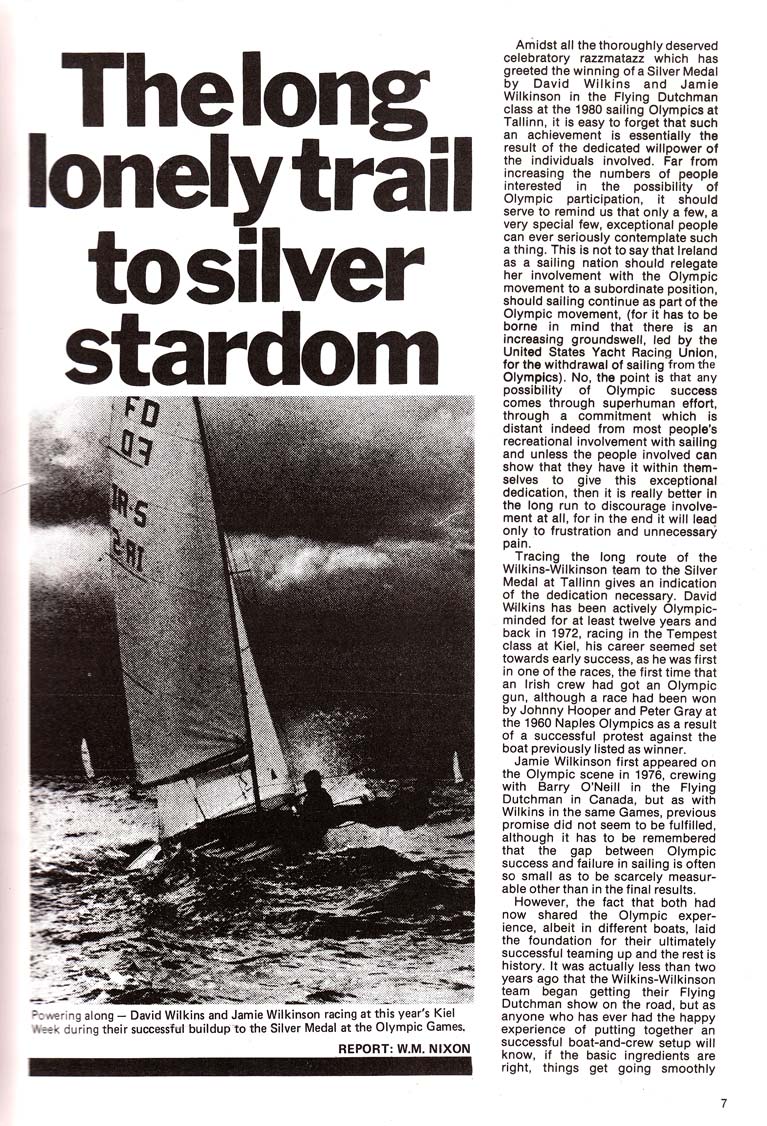 The outcome of the 1980 Olympics (above & below) as reported in the August 1980 edition
The outcome of the 1980 Olympics (above & below) as reported in the August 1980 edition
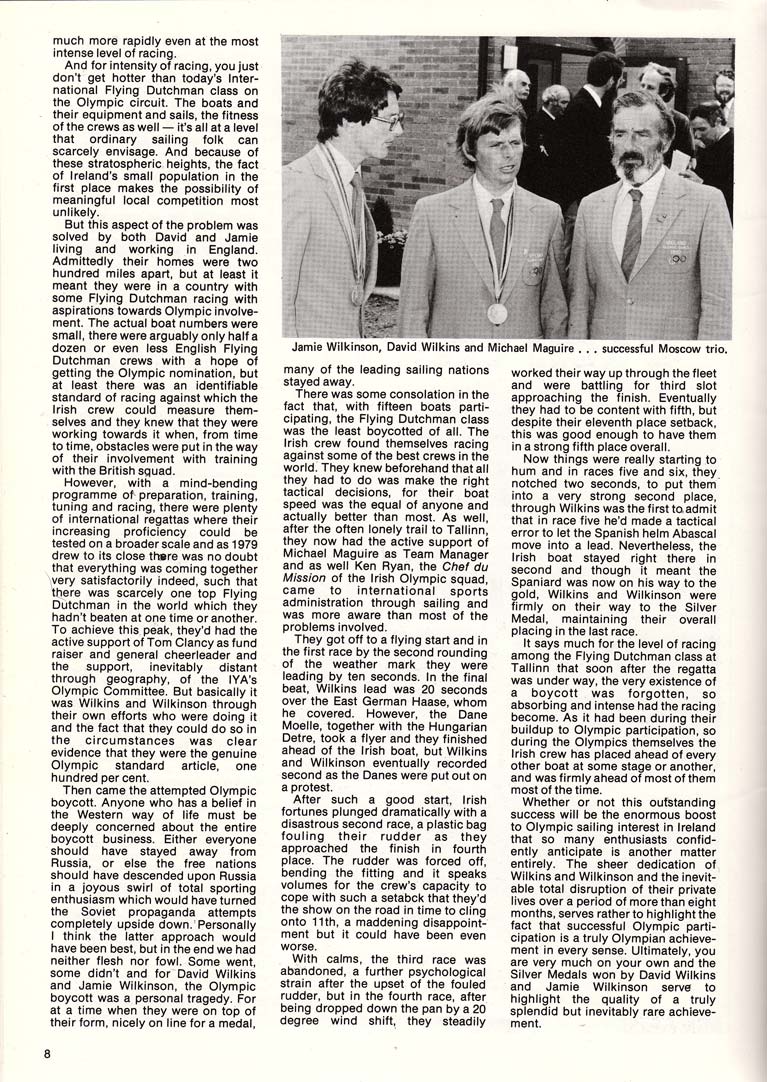
The main parts of the Moscow Olympics were held in the capital of what was then the Union of Soviet Socialist Republics, while the sailing events were staged in Tallinn in what is now independent Estonia. Gallant little Estonia is today seen as a bulwark of western democratic values, but in 1980 it was regarded from Moscow as little more than a glorified province of the 1980s version of Imperial Russia.
That 1980s version of Russian might was in the midst of an invasion of Afghanistan, in which they were ultimately no more successful than other would-be invaders of Afghanistan before and since. But nobody was to know that as the Olympic Games approached with the onset of the summer of 1980, and some of the more hawkish western nations decided to respond to the perceived illegal aggression against Afghanistan by boycotting the Moscow Games.
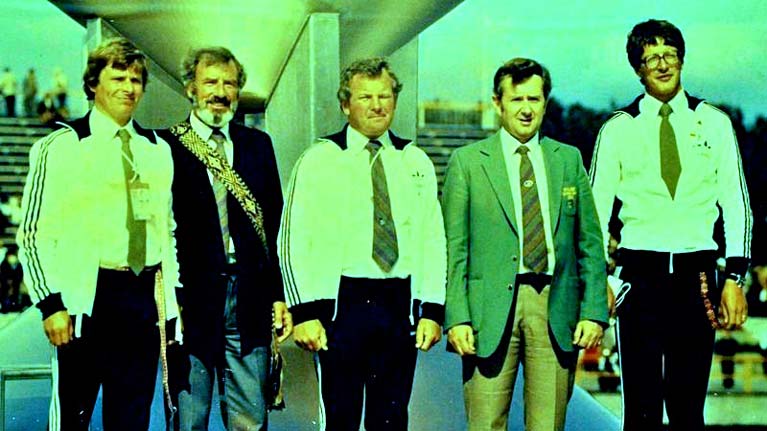 Before the start. The sailing team in Tallinn in 1980 with Irish international sailing administrator Ken Ryan, who was Chef d’Equipe for the entire Irish Olympic Squad of 1980. (Left to right) David Wilkins, Michael Maguire (Irish Sailing Team Manager) Kare Brevik (Meteorologist and Assistant Manager), Ken Ryan, and Jamie Wilkinson.
Before the start. The sailing team in Tallinn in 1980 with Irish international sailing administrator Ken Ryan, who was Chef d’Equipe for the entire Irish Olympic Squad of 1980. (Left to right) David Wilkins, Michael Maguire (Irish Sailing Team Manager) Kare Brevik (Meteorologist and Assistant Manager), Ken Ryan, and Jamie Wilkinson.
Others reckoned that such a boycott would solve nothing, and only provide needless mental torture for the athletes who had been bringing themselves to performance perfection precisely on the Olympic timeline. Opinions differed so much that within some nations, there were sports which did take part, while others didn’t.
Ireland was in a special situation, as the popular President of the International Olympic Committee, the overall global organising body, was our own Lord “Call me Michael” Killanin, a scion of the Morris family, one of the Tribes of Galway, and a man of many parts, being a sportsman, enthusiast, journalist, author, multiple company director, and a diplomat of formidable yet gracefully hidden talents.
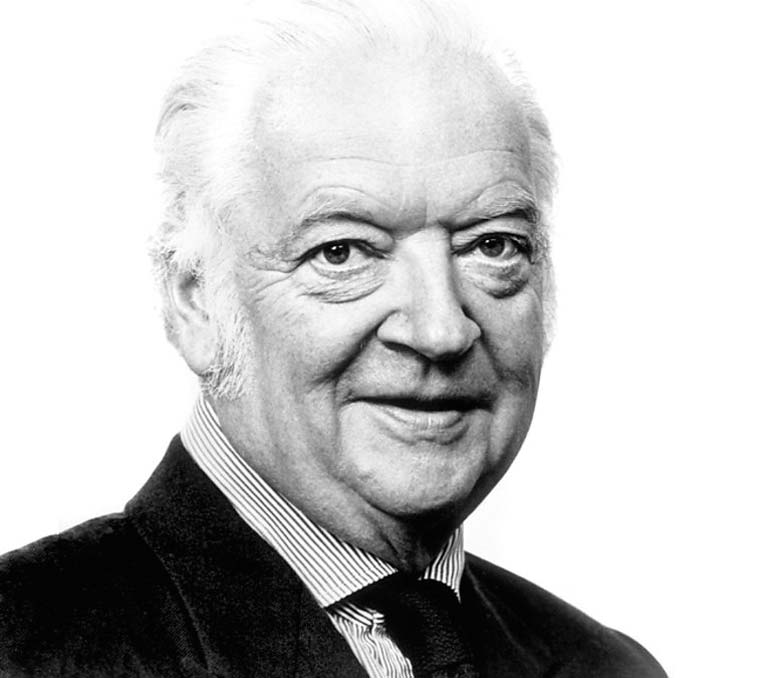 Lord Killanin (1914-1999), President of the International Olympic Committee from 1972 to 1980, and a man of many talents and enthusiasms.
Lord Killanin (1914-1999), President of the International Olympic Committee from 1972 to 1980, and a man of many talents and enthusiasms.
Somehow he managed to hold it all together such that a viable Olympics took place in a decidedly tense international situation. And for the Irish sailing squad, the high point came when Killanin and his top people descended on Tallinn for the awards ceremony in what was to be Lord Killanin’s last Olympics as President, and David Wilkins and Jamie Wilkinson received their Silver Medals from the man himself.
To say that it had been a long and difficult road for everyone to have reached this very special outcome is a massive understatement. But with the job done and the world moved perhaps a little further along the road of peace and some sort of sanity, there was now time and more available to savour what had been achieved. It was a very special moment for all the smaller sailing clubs of Ireland when the great and the good assembled at Malahide Yacht Club later in August 1980 to honour the Silver Medallists in the helmsman’s home place.
It was all in a much lower-key to the glitzy celebrations which welcomed home Annalise Murphy with her Olympic Silver Medal to the National Yacht Club in August 2016. But then, in 1980, Irish sailing was different, and in a very different world.
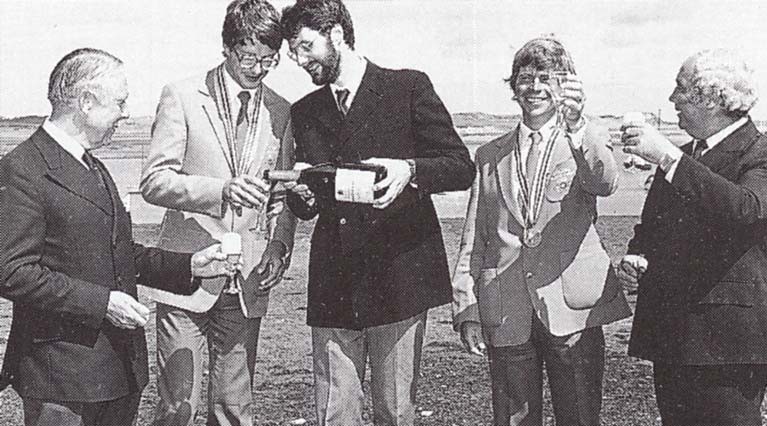 Bringing it all back home. The newly-won Olympic Silver Medals are celebrated in August 1980 at Malahide YC by (left to right) Bill Cuffe-Smith (Commodore Howth YC), Jamie Wilkinson, Peter Killen (Commodore, Malahide YC), David Wilkins, and Paddy Kirwan (President, Irish Yachting Association)
Bringing it all back home. The newly-won Olympic Silver Medals are celebrated in August 1980 at Malahide YC by (left to right) Bill Cuffe-Smith (Commodore Howth YC), Jamie Wilkinson, Peter Killen (Commodore, Malahide YC), David Wilkins, and Paddy Kirwan (President, Irish Yachting Association)
Virtual Regatta Esailing Game Gets Olympic Class Regatta Sites
World Sailing, the International Federation for the sport, and Virtual Regatta, the world-leading digital sailing platform, have launched several iconic Olympic class regattas in the eSailing world.
Regattas around the globe have been cancelled or postponed due to the Novel Coronavirus (COVID-19) pandemic - but eSailors will now be able to compete at some of the world's best-known sailing events online.
These events include:
- Trofeo Princesa Sofia
- World Cup Series, Genoa
- Kiel Week
eSailors can compete at Trofeo Princesa Sofia on Virtual Regatta from yesterday (Monday 30 March until 3rd April), at the World Cup Series, Genoa from 11th – 18th April, and at Kiel Week from 20th – 28th June, while other events will be launched at a later date.
Both World Sailing and Virtual Regatta have worked closely with each regatta to recreate each one as a virtual racecourse, available for eSailors all over the world to take part in.
In the current climate, it's more important than ever for us to feel connected with the rest of the sailing community. Making these world-famous Olympic class events accessible to everyone online gives us the chance to engage sailors of all ages and backgrounds, allowing all involved to continue to share their passion for the sport.
Recently there has been a huge increase in active daily users on Virtual Regatta Inshore, rising from 5,000 at the start of the year to around 18,000-20,000 and peaking at 25,000 this week.
At each regatta, the 49er and the Nacra 17 will be available for players to race at virtual replications of these real-life sailing venues.
The first few days of each event launch will consist of challenges. Ranked Medal Races will take place over the final two days, open to all players – no qualification for these races is necessary, but results will count towards World and National rankings for eSailors!
Additionally, Hempel World Cup Series Genoa will qualify as a 'blue challenge,' meaning the opening challenges will also count towards the official eSailing World Championship ranking.
These Medal Races for these challenges will also provide an opportunity for two eSailors (one from the 49er and one from the Nacra) to qualify for the eSailing World Championship Playoffs.This will give eSailors a chance at qualifying to the Live Final, where the 2020 eSailing World Champion will be crowned.
Existing eSailors and new players are invited to compete in these classic regattas for free from today!
The first challenge is available now and can be played on Virtual Regatta Inshore on Desktop – iOS – Android.
How Will Irish Olympic Sailors be Impacted if New Qualification Rules Apply for Last Tokyo Places?
What chances has Ireland got for the last Olympic places in the Finn, 49er and men's Laser classes if qualification changes are made?
The IOC, in their determination to maintain normality – or to return to normality as soon as possible – have issued a position update on the 2020 Tokyo Olympics and the potential changes to the qualification process disrupted by the spread of Covid-19.
Many sports, including sailing, have had to cancel qualifying events and the IOC has asked International Federations to consider revising the qualification process which may include ranking or historical results. For athletes planning to use the remaining events to qualify, this could mean the end of their road to Tokyo, and in some cases, the end of their careers. The negative implications of a revised qualification system have put athletes and the IOC at loggerheads, particularly as there are different restrictions on athlete training regimes across sports and countries.
It is hard to believe that the Games will run on schedule, not because of the state of play in August, but because a revised qualification system will surely end up in the Court of Arbitration for Sport when potential qualifiers feel excluded.
The IOC has declared a number of principles as follows:
- All quota places that have already been allocated to date remain allocated to the NOCs and athletes that obtained them.
- The possibility remains to use existing and scheduled qualification events, wherever these still have fair access for all athletes and teams.
- All necessary adaptations to qualification systems and all allocation of remaining places will be:
a) based on on-field results (e.g. IF ranking or historical results); and
b) reflect where possible the existing principles of the respective qualification systems (e.g. use of rankings or continental/regional specific event results).
If, as seems increasingly likely, ranking or historical results are used to determine sailing’s Olympic qualifiers, then how will Irish sailors be impacted?
Finn
Ireland is well out of the running here, both on ranking and results from the most recent Gold Cup. There is one European slot remaining, but the same six as yet to qualify countries that finished ahead of Ireland at the Gold Cup are also ahead of Ireland in the world rankings.
Laser
There are two European places yet to be won or allocated with four countries in the running – Belgium, Netherlands, Italy and Ireland. While Ireland finished behind all of these at the latest World Championships, Irish Laser Sailor Finn Lynch is ranked 13th, just one place behind the Italian. The top-ranked Belgian is 21st, while the Dutch ranking is 45th. In this case, a world ranking determination would see Ireland qualify for the Games.
49er
Ireland is vying with Belgium, Sweden and Italy for the one remaining European place. Form at the 2020 Worlds suggested that Irish sailors would be favourites having finished ahead of the other three candidates, but they are the lowest in a tightly packed group in the world rankings.
There is no doubt that no matter what option is chosen by World Sailing, the outcome will disadvantage some, benefit others, possibly leading to challenges at higher levels. Ireland may increase its representation in Tokyo, but only by one whether rankings or form is used. In this case, where the wisdom of Solomon is required, it appears the baby will end up in two parts no matter what.



























